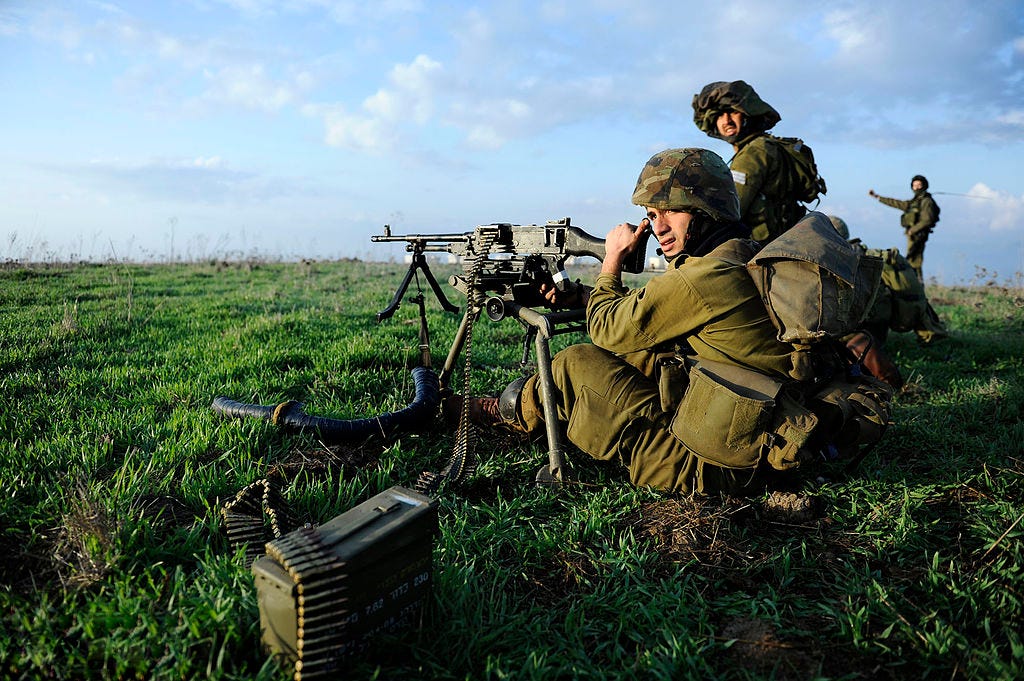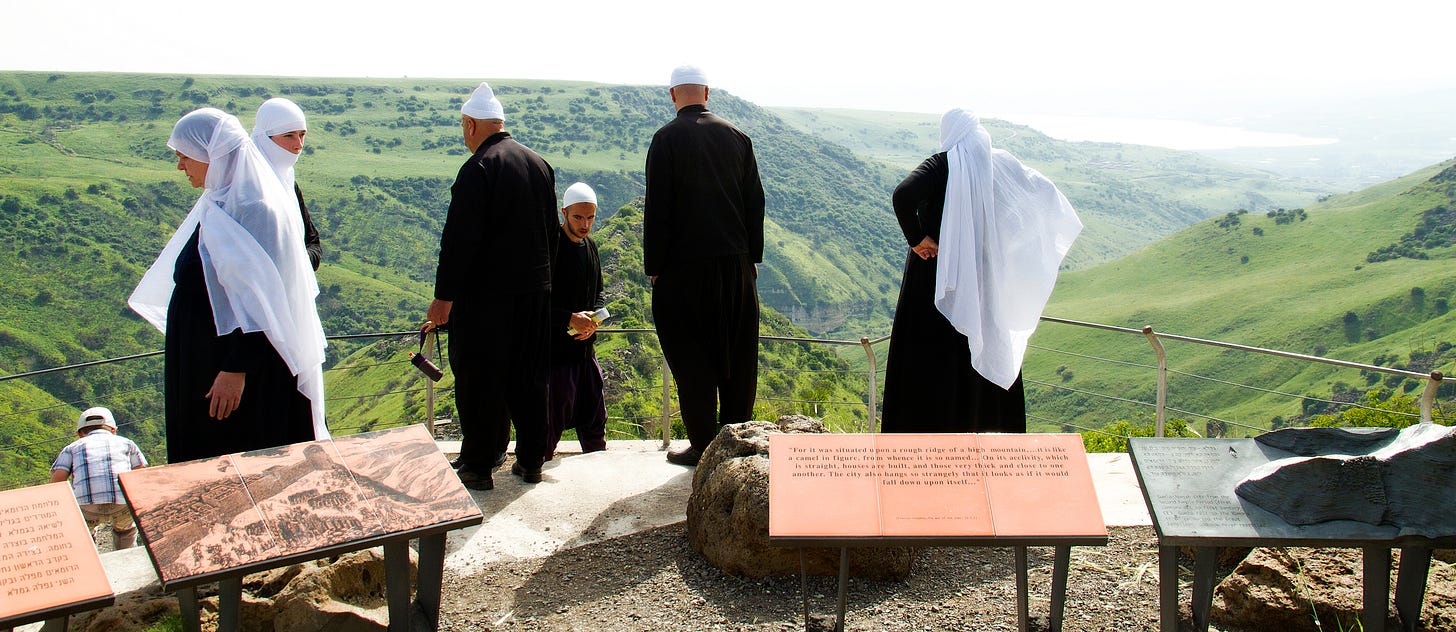They chose Israel over the Arab world. Israel chose them back.
The Druze are the most loyal minority in the Middle East, and Israel is the country that protects them.

Please consider supporting our mission to help everyone better understand and become smarter about the Jewish world. A gift of any amount helps keep our platform free of advertising and accessible to all.
You can also listen to the podcast version of this essay on Apple Podcasts, Google Podcasts, and Spotify.
In a region often defined by sectarian strife, the relationship between the State of Israel and the Druze community stands as a profound and enduring exception — a brotherhood forged not by convenience, but by loyalty, shared destiny, and mutual respect.
The Druze religious community began in the 10th century as an offshoot of Ismaili Shiite Islam but quickly developed into a unique, secretive ethno-religious group with its own theology and culture. One of its core tenets is loyalty to the country of residence, a survival strategy that made the Druze adept at balancing identity and citizenship across changing empires.
Leading up to the State of Israel’s founding in 1948, the Arab world was mobilizing for war against the nascent Jewish state. The prevailing expectation among Arab leaders, Arab citizens of Mandatory Palestine, and even many Jewish officials was that the Druze, as Arabic-speaking villagers located primarily in the Galilee and Carmel, would join their Muslim and Christian neighbors in opposing Israel’s creation.
But Druze leadership saw the situation differently.
Sheikh Amin Tarif, the most revered spiritual and communal leader of the Druze in Mandatory Palestine, was faced with a defining choice: align with the Arab League’s call for pan-Arab resistance, or chart an independent course with the nascent Jewish state.
Tarif was no Zionist. His primary concern was the safety, autonomy, and survival of his people. He understood that the Druze, a small religious minority often treated with suspicion or indifference in the Arab world, would be little more than cannon fodder in a war they didn’t start.
Secret meetings took place between Druze elders and representatives of the Haganah, the precursor to the Israel Defense Forces. While many Arab villages openly declared hostility toward Jewish communities, several Druze villages pledged neutrality or even cooperation. In return, Jewish forces agreed not to target Druze areas — and to treat them as potential allies, not enemies.
Sheikh Amin Tarif’s decision to remain neutral in the early phases of the war, and later to side openly with Israel, changed history. He persuaded Druze villages to avoid participation in the Arab revolt, helped facilitate safe passage for IDF units in strategic northern Israel areas, and cultivated an enduring relationship with Israeli Jewish leaders, including David Ben-Gurion (Israel’s founding prime minister).
In 1949, Sheikh Tarif made that alignment official. He visited the Knesset (Israeli parliament), recognized Israel’s sovereignty, and affirmed the Druze community’s desire to live as full citizens of the state. It was a groundbreaking move. While other Arab leaders were denouncing Israel’s existence using genocidal diction, Sheikh Tarif was inviting his community to help build it.
This decision came at a cost. The Druze were condemned by Arab nationalist movements, ostracized in some regional circles, and accused of betrayal by fellow Arabs. But the bet Sheikh Tarif placed, that Israel would treat the Druze as loyal citizens and not second-class subjects, proved correct.
In 1956, at the request of Druze leaders themselves, military service in the IDF became compulsory for Druze men. No other non-Jewish community in Israel has embraced such full integration into the defense establishment.
The Druze have served with distinction in virtually every branch of the IDF, often in elite combat roles. Some examples include:
Brigadier General Amal Asad – A highly respected Druze officer who served as deputy commander of the Northern Command. He was one of the first Druze to reach the rank of brigadier general and helped develop cross-border security doctrine along the Lebanese border.
Colonel Ghassan Alian – The first Druze officer to command the elite Golani Brigade, one of the most prestigious and heavily deployed units in the IDF. He led troops during Operation Protective Edge in Gaza in 2014.
Lieutenant Colonel Ayoub Kara – A former senior officer in IDF intelligence who later became a Likud Knesset Member and served as Communications Minister. Kara often used his Druze Arabic to build bridges in Israeli foreign relations, particularly with Gulf states and minorities in Syria and Lebanon.
The Herev Battalion – A now-disbanded, majority-Druze combat unit that served on the northern frontlines. Many Druze soldiers have since opted to serve in mixed or elite units, reflecting their full integration.
IDF Intelligence (Aman) and Unit 8200 actively recruit Druze Arabic speakers, whose dialect and cultural familiarity with neighboring Syrian and Lebanese communities offer critical intelligence advantages. These Druze operatives have played vital roles in monitoring Hezbollah, infiltrating Arabic-language networks, and providing real-time translation in psychological warfare and counter-terror operations.

There are also the Mista’arvim units, made up of elite operatives who pose as Arabs to conduct counter-terrorism operations in Palestinian areas. Mista’arvim relies heavily on native or near-native Arabic fluency, cultural familiarity, and physical appearance that allows operatives to blend seamlessly into Arab communities. This makes Druze soldiers especially valuable assets to these units.
Druze Arabic is distinct from Palestinian dialects, but Druze operatives grow up immersed in Arabic culture and language, giving them the kind of linguistic intuition and nuance that no classroom training can replicate. Many also grow up in mixed or adjacent communities, developing a deep understanding of cultural norms, family structures, and street dynamics within Arab society — critical for undercover work.
While the exact composition of these elite units is classified, it is well known in military and intelligence circles that Druze soldiers have served with distinction in Mista’arvim operations, particularly in:
Surveillance and intelligence gathering within Judea and Samaria (also known as the West Bank) and East Jerusalem hotspots
Counter-terror raids in urban centers, where blending in is key to surprise and success
Interrogation and human intelligence roles, where dialect and demeanor are critical
This role isn’t without complexity. For some Druze families, particularly those with relatives in Syria or Lebanon, serving in units that operate in Arab territories or against Arab populations requires careful internal navigation. Yet the overall Druze ethos of loyalty to the state and defense of Israel means that Druze participation in these undercover units is widely respected and encouraged within their community.
Israeli Druze have also risen through the ranks of Israel’s police, judiciary, and government. From border police commanders to Knesset members, Druze citizens have played integral roles in Israel’s civic and national life.
In return, Israel has recognized the Druze community as a loyal and valued minority, investing in Druze towns, recognizing Druze religious courts, and honoring Druze fallen alongside Jewish ones.
This deep integration is even more remarkable when contrasted with the situation of the Druze in neighboring countries — especially Syria.
Today, the global Druze population numbers around one million, with more than half residing in Syria, primarily in the southern Sweida province and in suburbs around Damascus such as Jaramana and Ashrafiyat Sahnaya. The remainder are scattered across Lebanon and Israel, with about 150,000 Druze living inside Israel and in the Golan Heights, which was captured from Syria in the 1967 Six-Day War and later annexed.
In Syria, the Druze have long walked a tightrope, accommodating authoritarian regimes while trying to protect their distinct religious identity and local autonomy. The outbreak of the Syrian civil war in 2011, and the subsequent rise of Islamist factions hostile to religious minorities, placed Syria’s Druze under grave threat. Sectarian violence, kidnappings, and massacres followed, often ignored by the international community.
Recent events brought renewed urgency to this historical relationship. As sectarian tensions flared in southern Syria, particularly in the Sweida region, and amid new Islamist threats to the Druze population there, Israel acted — not just with words, but with unmistakable resolve.
On May 3rd, the IDF confirmed an airstrike near the palace of Ahmed Hussein al-Sharaa in Damascus. Though the exact target was not revealed, Israeli officials made the motive clear. In a joint statement, Israeli Prime Minister Benjamin Netanyahu and Defense Minister Israel Katz emphasized: “Israel will not allow any harm to happen to the Druze community.”
Katz later elaborated, warning Syria’s leadership that Israel is determined to protect the Druze: “When Sharaa wakes up in the morning and sees the results of the Israeli airstrike, he will understand well that Israel is determined to prevent harm to the Druze in Syria.”
But Israel’s support wasn’t limited to military deterrence. In an unprecedented act of cross-border humanitarian solidarity, the Israeli Air Force dispatched a helicopter carrying aid to the embattled Druze population of Sweida — reportedly the first time aid has been delivered in this manner. This move underscored the sincerity of Israel’s vow: to treat the Druze of Syria not as foreign others, but as family.
Israel’s Druze community has long referred to their Syrian co-religionists as “brothers,” and this is not metaphor. It is a bond reinforced by shared language, history, culture, and blood. It is also a bond sanctified by the Druze community’s guiding principle of taqiyya — prudence in the face of threat — and its parallel value of loyalty to protectors and friends.
For Israel, the Druze are more than citizens; they are partners in the Zionist story. The Jewish People, long treated as strangers in the lands of their birth, now extend protection to another vulnerable people fighting for their existence. In a world where alliances are too often transactional, the Israeli-Druze brotherhood offers a rare example of trust earned, loyalty reciprocated, and kinship lived out through action.
As the fires of sectarianism rage just beyond Israel’s borders, the State of Israel has once again made its position clear: It will not stand idle while its Druze brothers face annihilation. Through decisive military deterrence and humanitarian outreach, Israel has demonstrated that this brotherhood is not symbolic; it is strategic, emotional, and profoundly human.
In defending the Druze of Syria, Israel is not merely protecting a minority. It is honoring a bond, affirming a shared fate, and upholding the moral clarity that comes from remembering who stood by you — when few others would.
And it also reveals something else: Israel’s core values.
In a region where loyalty is often transactional, and where minorities are routinely persecuted, Israel’s commitment to the Druze (both inside and outside its borders) demonstrates moral clarity in a landscape clouded by double standards and shifting alliances. While others weaponize sectarianism, Israel protects a vulnerable religious minority, one with whom it shares not ethnicity or religion, but mutual respect, civic partnership, and shared sacrifice.
Israel did not have to fly aid to the Druze of Sweida. It chose to. It did not have to issue warnings to Damascus over threats to Druze civilians. It chose to. These are not the actions of a cynical “occupier” — but of a nation guided by principle, even when doing so risks criticism, complication, and confrontation.
In standing by the Druze, Israel stands by its values: loyalty to its allies, protection of the vulnerable, and a refusal to abandon those who have stood by its side. That’s not just solidarity. It speaks to the soul of our Jewish nation, and what sets Israel apart.



This is a must read article, for better understanding Israel’s going to the aid of the Druze in Syria. Uplifting actually..
Appreciate learning this history! Explains a lot.
L